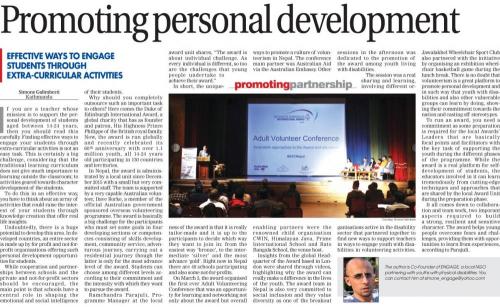
If you are a teacher whose mission is to support the personal development of students aged between 14 and 24 years, then you should read this carefully.
Finding effective ways to engage your students through extra-curricular activities is not an easy task.
Certainly this is a big challenge, considering that the traditional learning curriculum does not give much importance to learning outside the classroom, to activities geared towards the character development of the students.
To do this in an effective way, you have to think about an array of activities that could raise the interest of your students through knowledge creation that offer real life insights.
Undoubtedly there is a huge potential to develop this area. You should just know that in more developed countries, an entire sector is made up by for profit and not for profit organizations offering such personal development opportunities for the students.
While cooperation and partnerships between schools and the private and not for profit sectors should be encouraged, the main point is that schools have a central role in shaping the emotional and social intelligence of their students.
Why should you completely outsource such an important task to others?
Here comes the Duke of Edinburgh International Award, a global charity that has as founder and patron His Highness Prince Philippe of the British royal family.
Now the Award is run globally and recently celebrated its 60th anniversary with over 1.1 million youths, all 14 to 24 years old participating in 130 countries and territories.
In Nepal the Award is administrated by a local unit since December 2015 with a small but very committed staff.
The team is supported by a very capable Australian volunteer, Dave Rorke, a member of the official Australian government sponsored overseas volunteering program.
The Award is basically a big challenge for the participants who must set some goals in four developing sections or competencies consisting of skills development, community service, adventurous journey and carrying out a residential journey though the latter is only for the most advance level of the award.
Yes students can choose among different levels according to their commitment and the intensity with which they want to pursue the award.
Ramchandra Parajuli, Program Manager at the local Award Unit shares” The Award is about individual challenge. As every individual is different, so too are the challenges that young people undertake to achieve their award."
In short the uniqueness of the Award is that it is really tailored made and it is up to the participants to decide which way they want to join it: from the easiest way “bronze”, to the intermediate “silver” and the most advance “gold”.
Right now in Nepal there are 48 schools participating and also some not for profits.
On the 3rd of March, the Award organized the first ever Adult Volunteering Conference that was an opportunity for learning and networking not only about the award but overall about ways to promote a culture of volunteerism in Nepal.
The conference main partner was Australian Aid via the Australian Embassy. Other enabling partners were the renowned child organization CWIN, Himalayan Java, Prime International School and Rato Bangala School, the venue host.
Insights from the global Headquarter of the Award based in London were shared through videos, highlighting why the award can really make the difference in the lives of the youths.
The Award team in Nepal is also very committed to social inclusion and they value diversity as one of the breakout sessions in the afternoon was dedicated to the promotion of the Award among youths living with disabilities.
The session was a real sharing and learning involving different organizations active in the disability sector that partnered together to find new ways to support teachers in ways to engage youths with disabilities in volunteering activities.
Jawalakhel Wheelchair Sport Club also partnered with the initiative by organizing an exhibition wheelchair basketball game during the launch break.
There is no doubt that volunteerism is a great platform to promote personal development and in such way, youths with disabilities but also other vulnerable groups can learn by doing, showing their commitment towards the nation and casting off old and stupid stereotypes.
To run an award you need a commitment as some preparation is required for the local Awards’ Leaders that are basically focal points and facilitators with the key task of supporting the youths during the different phases of the program.
While the Award is a real platform for self-development of the students, the same educators involved in it can learn tremendously from cutting edge techniques and approaches that are shared by the local Award Unit during the preparation phase.
It all comes down to collaboration and team work, two pillars to create strong, resilient and sensitive character.
The Award helps young people overcome the fears and challenges, providing them with opportunities to learn from experiences, explain Ramchandra.
I hope all educators reading this piece will seize the opportunity and join the Award. For more info, http://doeianepal.org/










Add new comment